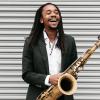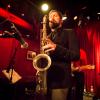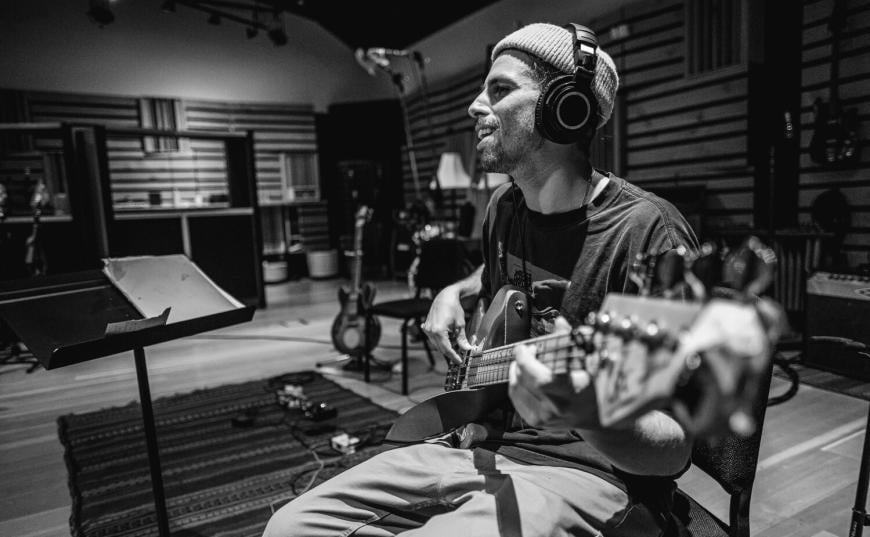
The knife didn’t even belong to Giulio Cetto. He and his partner, Xiani Wang, had dropped off their kitchen set to be sharpened at a knife shop not far from their home in San Francisco’s Excelsior District earlier that day in late January and came home with a 10-inch loaner blade, “much bigger than any knife we own,” said Cetto, 33, an acoustic and electric bassist who’d spent the previous six years making himself a ubiquitous presence on the Bay Area jazz scene.
Putting away dishes after dinner, he reached up to the third shelf where the cups go and as he brought his arm down his elbow encountered the knife, which Xiani had placed point up in the drying rack moments before. “It felt like I’d hit my funny bone on the sharpest corner in the world, which I guess I did. My body went into shock mode.”
Cetto had severed the ulnar nerve in his left arm, a potentially career-ending injury. Xiani was pregnant, about two weeks away from her due date, and Cetto tried to stay calm as she squeezed behind the wheel and drove him to San Francisco General, thinking that a sudden spike in stress wouldn’t be good for the baby. He had lost all feeling in his fingers. and a pins-and-needles electric current coursed up and down his arm.
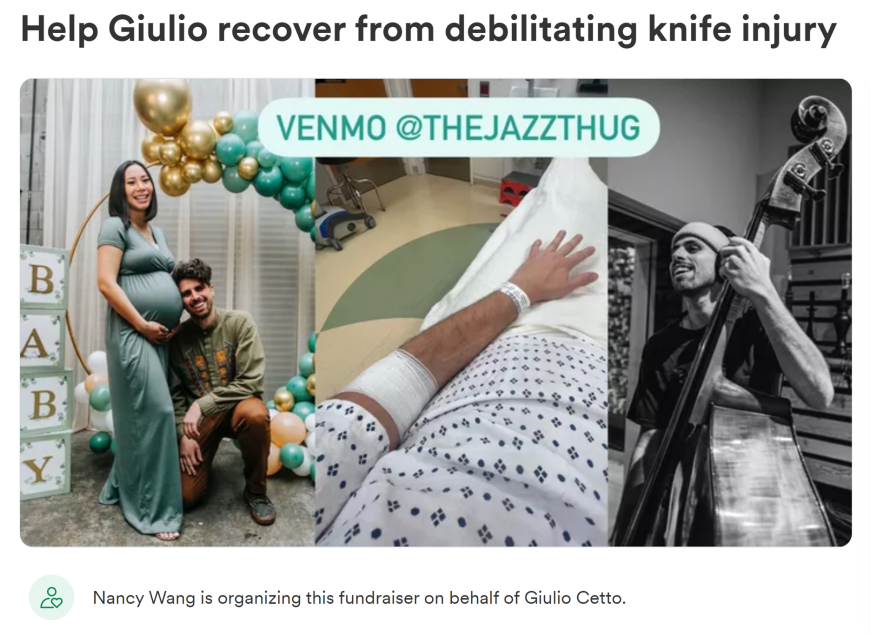
News about the freak accident spread rapidly across the Bay Area music scene when Xiani’s mother launched a GoFundMe campaign. On the webpage the before-and-after juxtaposition of a beaming Cetto kneeling with his ear pressed to Xiani’s third-trimester belly and a photo of him in hospital with bandaged arm underlined just how drastically the family’s situation had changed. Cetto was known as a workhorse, and dozens of gigs suddenly vanished. He says the response to the online crowdfunding campaign was almost as rapid and shocking, raising more than $50,000.
“The love was overwhelming,” said Cetto. “People I never met gave $1,000. A bunch of my friends stepped up. I also applied to MusiCares and all these foundations, and they would call me back in five minutes. Everyone was supportive. Friends started a MealTrain and brought us food for two months straight. The whole community rallied.”
After several weeks sorting out the insurance, Cetto had surgery to repair the damage, which involved transferring nerves from his arm. There was no way to tell whether he’d recover function in his fingers. The wave of support from friends, strangers, and acquaintances buoyed his spirits, but it was his son Xuji Amaru “that helped me heal, forcing me to get out of bed and do a lot of things,” he said. “I was really depressed and afraid that I wouldn’t be able to do this thing I loved. I was really down, sad, and nervous. But this beautiful baby really didn’t allow me to mope too long.”
I caught up with Cetto last week playing with saxophonist Kazemde George and vocalist Sami Stevens at Bird & Beckett Books and Records, and his recovery is clearly proceeding apace. A master accompanist, he found the sweet spot on each tune, defining the groove as the quintet moved from the fast-flowing harmonies of George’s post-bop compositions to Stevens’s lithe R&B. Playing double bass, he soloed with authority and didn’t seem to show signs of the injury. He knows better.
“I can still do a lot,” he said. “I can still take solos, but I know I’m missing half of my hand. Your pointer and middle are controlled by the radial nerve, and ring and pinky by the ulnar. My pointer and middle are strong. My ring finger has come a long way, and I’m using it more. We’re just rooting for that pinky to get onboard. I can’t tell you how grateful I’ll be if I get that back. If you can’t feel it, you can’t use it.”
Another big change is that Cetto is choosing his gigs much more carefully now. After playing Outside Lands on Aug. 5 with Spellling, the Oakland experimental pop singer he started working with in 2018, he’ll be joining her for a national tour in October. He’s teaching at the Stanford Jazz Workshop this week and playing a string of gigs with rising New York-based Cuban-born vocalist Gina D’Soto, including Aug. 11 at Mr. Tipple’s and Aug. 12–13 for Lakehouse Jazz in Golden Gate Park. His jazz/metal/hip-hop combo Big Trippin’ is the house band at SkyBridge on Stevenson, playing every Thursday night from Sept. 15 – Nov. 3. Taking time to enjoy his family, he continues to process the way they were embraced by a music community still recovering from the pandemic’s decimation.
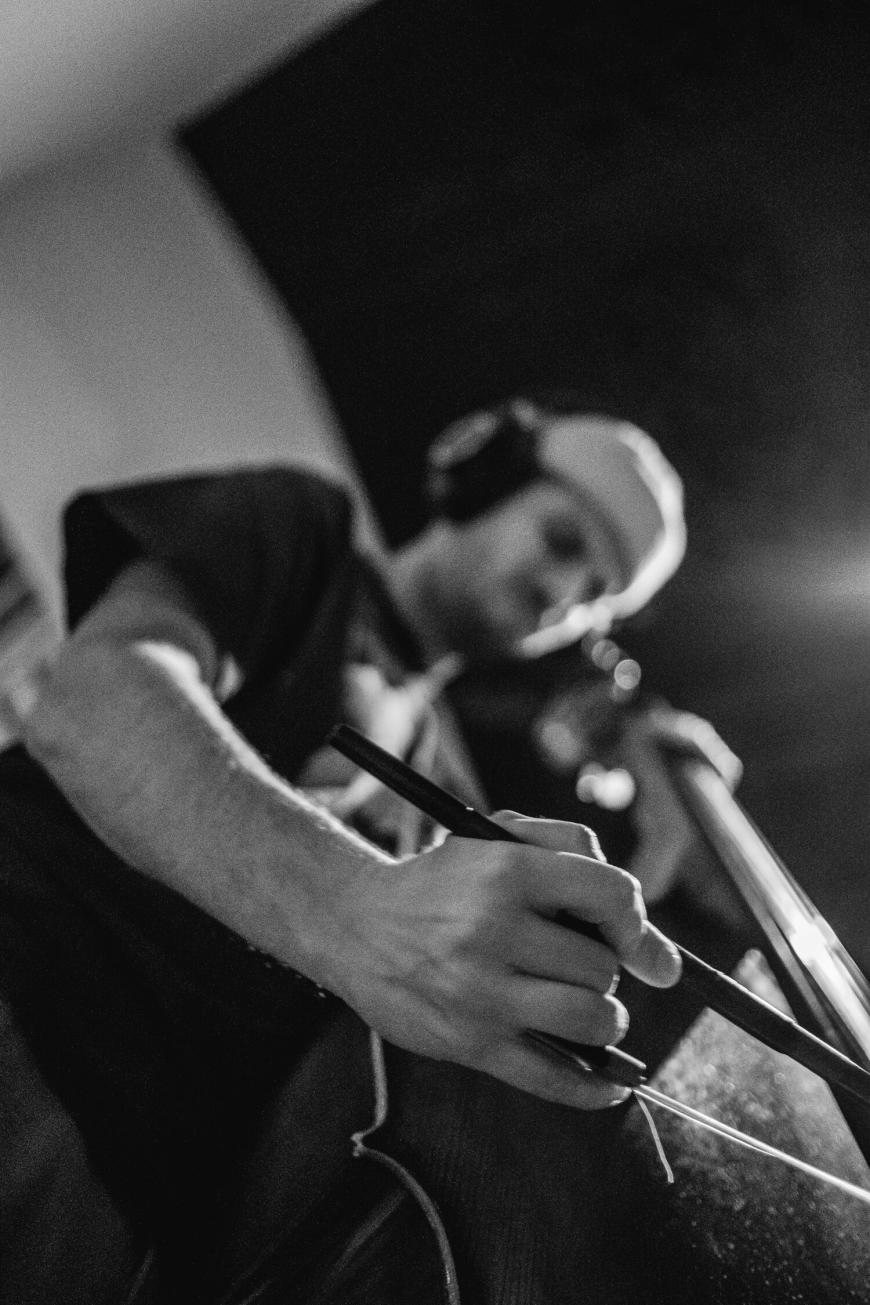
The response was a direct reflection of the love that Cetto has garnered on and off the bandstand. He’s forged deep friendships across the Bay Area’s musical landscape, while serving as a conduit for countless gigs. In many ways, bassists occupy a paradoxical position, indispensable to their peers but often overlooked by non-musicians. A good bassist with a modicum of professionalism is rarely in want of a gig. A great bassist is treasured, and it’s no exaggeration to say that the scene shifts when a key player departs.
In his late 20s, Cetto had come to occupy a pivotal spot “at the center of many different nodes integral to the Bay Area scene,” said trumpeter Ross Eustis, digital projects manager at SFJAZZ and the co-founder of the artist-centric label Slow & Steady Records (which has featured Cetto on a disparate array of projects). “He plays with everybody but is building his own scene. I’m always seeing him at SFJAZZ. I went out to the Samora Pinderhughes premiere at YBCA [Yerba Buena Center for the Arts], and of course Giulio is there with Xiani and newborn. He’s a presence and just good people.”
Cetto’s particular skillset fully blossomed at Black Cat, the Tenderloin jazz club that has carved out a singular niche as the primary Bay Area venue for a brilliant cadre of New York-based bandleaders such as trumpeter Theo Croker, drummer Kassa Overall, saxophonist Kazemde George, and pianists Johnny O’Neal, Eric Lewis, and Laurence Hobgood, among many others. Cetto was there at the beginning when Fritz Quattlebaum opened the venue in 2016, and he quickly became a pillar of the seven-nights-a-week music policy. In one particularly prolific year, he played Black Cat nearly every other night.
As Cetto suggested other Bay Area players to fill the club’s calendar, he often ended up working with them (though there was never an official house band). By 2018 out-of-town players came to dominate Black Cat programming, and Cetto’s reputation spread as a bassist who could “do anything because he’s so versatile in his thinking,” said trumpeter Croker, who’s played more than a dozen multinight residencies at the club, more than any other artist. Returning a phone message between gigs in Paris (while ordering from a Chinese restaurant in Mandarin, a language that first came in handy during the seven years he played a key role in sparking the Shanghai jazz scene), Croker didn’t want to miss the opportunity to celebrate Cetto.
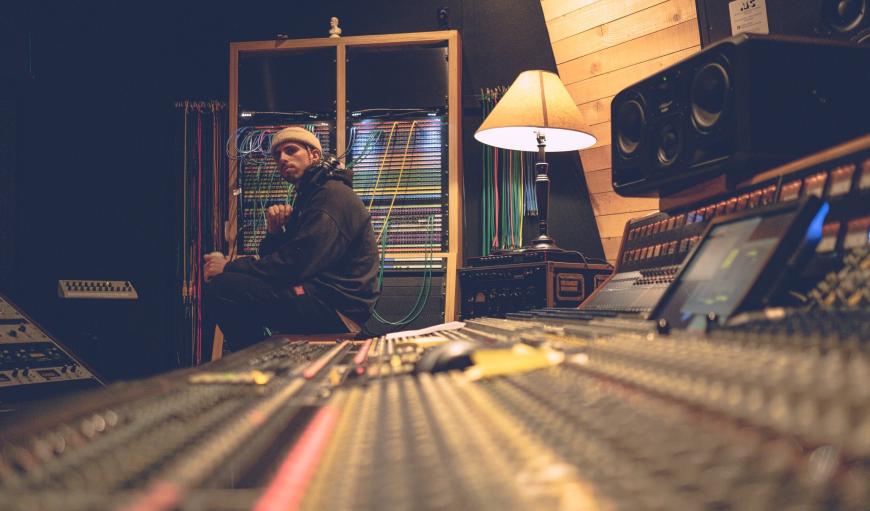
“I’ve seen him grow over the years, and he’s just constantly getting better and smarter as a player. When you have that type of authenticity playing Black music, it’s a great thing. I’ve booked him outside of San Francisco because of how well he’s played my music. I’ve gone into Black Cat with the idea of workshopping new tunes and figuring out how to present it, and I get Giulio because he’s able to do that on such a high level with so many bands. He’s been an integral part of that club. When someone [with a big] name comes through, they can call Giulio, and he can put together the right situation for that artist. He has a music director’s sensibility. But beyond all of that, I love Giulio. He’s an amazing human being.”
It’s not just that Cetto can step into an existing band as the only local ringer and take care of business. He’s often tackling an artist’s original music, which means getting his hands and head around a new set of ideas. What makes the situation tenable is that Black Cat often books musicians for three- to five-night runs, with two or three shows a night, which gives Cetto a chance to settle into the music. “I love doing it, and I’m good at doing it,” he said. “In the rhythm section we create the vibe for the song, and one thing that’s my strength is hearing a vibe and being able to adapt quickly. Theo’s band pushed me a lot. One time it was his entire regular band except for the bassist. I couldn’t be that weak link.”
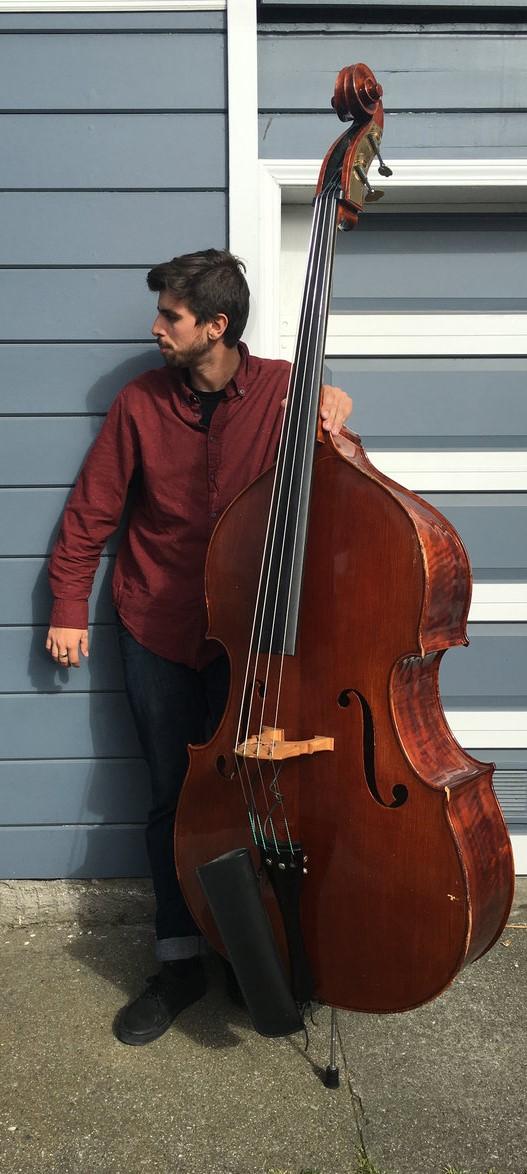
Was Cetto born with a musical gift, or did he get some special training? Yes. His Venezuelan-born mother grew up in the country’s vaunted music education program El Sistema and came to the States to study piano and voice at Boston Conservatory, where she met his father. He’s a pianist, singer, and choir director who spent some two decades on the music faculty at University of the Pacific in Stockton, where Cetto grew up. An ardent jazz fan who’d studied with alto sax legend Jackie McLean at the University of Hartford, his father turned Cetto on to Miles Davis, John Coltrane, Joni Mitchell, and the Beatles.
He grew up singing in choirs and studied violin through the seventh grade, but when Fresno educator Sheldon Schlesinger told Cetto that he looked like a bass player, he decided to check out the instrument. “I don’t know what he meant, but I was a kind of chubby skateboard kid, so I can kind of see that,” Cetto said. “It felt so much more natural than the violin, which was so small and cramped. I went and got an electric bass. My dad used to listen to Pat Metheny and Jaco Pastorius, and I got really into fusion.”
His dad supported the move, noting that “everyone needs a bass player.” Practicing the violin had always been a chore, but the bass became a boon companion. In class, Cetto was now the band kid having the best day ever when he got to play. Coming home from school he and his father would play standards together, such as “My Favorite Things” and “Someday My Prince Will Come,” or Cetto would make up his own tunes. His mother got a job teaching Spanish at Stockton’s Lincoln High so that Cetto and his flutist sister could attend a school with a strong music program.
Accepted at Berklee College of Music, he deferred and then deferred again as he started gigging around the Central Valley. He took some classes with drummer Brian Kendrick at San Joaquin Delta College, which proved valuable, but he mostly pursued a musical education ad hoc as a faculty brat at UOP, where he had the run of the campus. The university’s Brubeck Institute attracted some of the nation’s finest young musicians, and Cetto befriended players like pianist Javier Santiago and drummer Adam Arruda. “I connected with Christian McBride,” he said. “If Stefon Harris is coming to do a master class, I’m going to be in the room. I didn’t have to go to UOP. I’d skateboard around campus and go where I wanted.”
He spent several more years kicking around Stockton, but when his father put the family house on the market in 2014, Cetto realized he had to make a move. He ended up in an Oakland apartment behind Birdland Jazz Club and gradually came to realize that he was well equipped to thrive on the Bay Area scene.
“I don’t think I realized how good I was until I moved to the Bay Area and joined a bigger pool,” he said. “I was scared to go to New York and scared to go to college. But once I got out here, I was blown away by all these people being so kind and supportive. I feel I could move anywhere now.”


